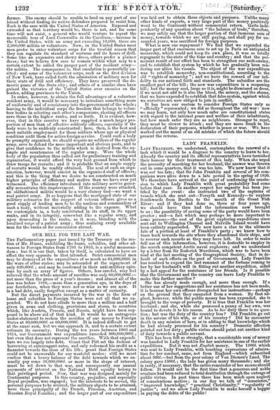OUR BILL FOR THE LAST WAR.
TEE Parliamentary paper just issued by the Treasury on the mo- tion of Mr. Hume, exhibiting the loans, subsidies, and other ad- vances to Foreign States from 1793 to 1853, is a useful memoran- dum ; but it is one that, taken by itself, is calculated to have an effect the very opposite to that intended. Strict commercial men may be dismayed at the expenditure of so much as 64,000,0001. in the wars of other states; may be astounded at the repayment of only 620,000/. ; and may be confirmed in their anti-military opin- ions by such an array of figures. Others, less careful, may feel relieved that the whole amount of sacrifice was only 60,000,000/.— not more than the gross of a year's income ; and almost all of the loss was before 1816,—more than a generation ago, in the days of our forefathers, when they were not so wise as we are now. It is a bad debt, easily forgotten except as a matter of curiosity. But the direct payments incurred by the war in the form of loans and subsidies to Foreign States were not all that we ex- pended. We do not here allude to more than a million and a half given in arms and clothing, provisions and stores, to countries which, like Austria, Prussia, and Russia, might have been sup- posed to be above aid of that kind. It would be an outrageous under-statement to reckon the sacrifice of our money to Foreign States at 50,000,0001. or 60,000,0001. It is indeed difficult to get at the exact sum, but we can approach it, and to a certain extent estimate its enormity. During the ten years between 1803 and 1814, our Government war expenditure exceeded 800,000,000/. ; but even that does not represent the sacrifice. With that expendi- ture we ran largely into debt. Grant that Pitt set the fashion of borrowing at extravagant rates, and only redeemed his credit as a financier towards the close of his life ; grant that Foreign States could not be answerable for our wasteful modes : still we must confess that a heavy balance of the debt towards which we an- nually pay some 26,000,000/. or more in the shape of interest, must be set down to that war, and consequently our annual payments of interest on the National Debt equally belong to that privileged period. Now, that war was designed mainly for Continental purposes. In this country, prejudice, and especially Royal prejudice, was engaged; but the interests to be served, the personal purposes to be secured, the military objects to be attained, were those principally of the French, Prussian, Austrian, and Russian Royal Families; and the larger part of our expenditure was laid out to obtain those objects and purposes. ,Trnlike many other kinds of exports, a very large part of this money positively went to the Continent without commercial return. Quite inde- pendently of any question about " the balance of trade," therefore, we may safely say that the larger portion of that immense sum of money, towards which we are still paying, and shall pay for un- counted years, was sacrificed for foreign purposes. What is now our repayment ? find that we expended the larger part of that enormous sum to set up in Paris an antiquated monarchy, which could not keep its own place, it was so totally repugnant to the state of the time and country ; and that the per- manent result of our effort' has been to strengthen our arch-enemy, and to establish that systemby which he has gradually been ren- dering our allies his vassals. The object of the war expenditure was to establish monarchy, non-coristitutional, according to the old "rights of monarchy '' and we haVe the reward of our infi- delity to our national'faith and standards. The subsidies .are the smallest part of the hill ; the new war expenditure is a reopening bill; but the money cost, large as it is, might be dismissed as dross, if we must not add to it also the blood, the misery, and the shame, that we have expended to establish that false system, against which we onrsel-Ves are now Obliged to join in conflict. It has been our custom to consider :Foreign States only as " officially " represented; we did so throughout the old war: now we may learn, not only how much Safer are constitutional states with regard to the internal peace and welfare of their inhabitants, but how much safer they are as neighbours. Stronger 'to repel, they must•be slower to attack ; and' they are more 'frank in the declaration of their purposes, whether'in peace or war. We have worked out the moral of an old mistake of which the future.ahould present the reverse..


























 Previous page
Previous page